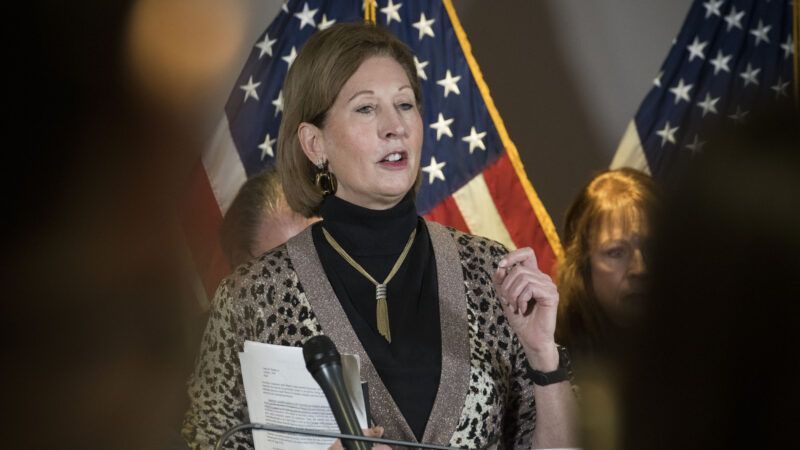Sidney Powell, Who Denied That Her Wacky Election Conspiracy Claims Were Statements of Fact, Now Says She Will Prove They Were True
The former Trump campaign lawyer plans to defeat defamation lawsuits by showing "what actually happened."

Former Trump campaign lawyer Sidney Powell, who faces defamation lawsuits seeking billions of dollars in damages because of her wacky claims about presidential election fraud, argues that her accusations against Dominion Voting Systems are not actionable because "no reasonable person" would have understood them as statements of fact. But her comments at a conference last month in Dallas undermine that already risible defense.
"I don't think they realized that some of us litigators were going to catch on and hold their feet to the fire and expose what really happened," Powell said during the "For God & Country: Patriot Roundup" gathering on Memorial Day weekend, which also featured prominent election conspiracy theorists such as former national security adviser Michael Flynn, former Florida congressman Allen West, and Rep. Louie Gohmert (R–Texas). She predicted that Dominion's lawsuit will be dismissed because "we meant what we said, and we have the evidence to back it up." If the lawsuit proceeds, she added, "then we will get discovery against Dominion, and we will be on offense." Powell also held out hope that Donald Trump "can simply be reinstated" after "a new inauguration" once her claim that Joe Biden stole the election with Dominion's help is verified.
That stance is quite different from the position that Powell's lawyers took in their response to Dominion's defamation complaint last March. Although Powell repeatedly implicated the company in an elaborate international conspiracy to deprive Trump of his rightful victory in the 2020 election, they said, "no reasonable person would conclude that the statements were truly statements of fact." They suggested that the implausibility of Powell's accusations meant they could not qualify as defamation:
Plaintiffs themselves characterize the statements at issue as "wild accusations" and "outlandish claims." They are repeatedly labelled "inherently improbable" and even "impossible." Such characterizations of the allegedly defamatory statements further support Defendants' position that reasonable people would not accept such statements as fact but view them only as claims that await testing by the courts through the adversary process.
Powell herself described her charges against Dominion, which she said had systematically switched "millions" of Trump votes to Biden votes, as "legal opinions that she stands behind, as they were based on sworn affidavits, declarations, expert reports and documentary evidence." At the same time, she insisted those "legal opinions" could not be defamatory because they were not "statements of fact."
But now Powell is saying she will defeat Dominion's lawsuit by showing "what really happened"—i.e., by proving the truth of her claims. "We meant what we said, and we have the evidence to back it up" is impossible to reconcile with the position that Powell was not making statements of fact.
"That seems like an extremely damaging admission from Ms. Powell that eviscerates her main defense, which is based on a distortion of the opinion doctrine to begin with," Ted Boutrous Jr., a defamation specialist at Gibson Dunn, told The Daily Beast. "Dominion will have a field day with this statement in opposing her efforts to dismiss the case before trial, and before the jury if and when the case goes to trial."
Two other lawyers interviewed by The Daily Beast were more equivocal, but they agreed that Powell's vow to prove that Dominion actually was involved in an unprecedented election conspiracy did not help her case. "Powell's rather odd statement certainly won't help her defense," said Sam Terilli, former general counsel for the Miami Herald. "It's just hard to know in advance, but it clearly could be a problem."
Reason Contributing Editor Ken White, a First Amendment specialist, told The Daily Beast Powell's recent comments could come back to haunt her if Dominion's lawsuit survives her motion for dismissal. "Her stance 'I can prove it' is definitely inconsistent with her lawyers' stance 'nobody would take it as anything but opinion,'" he said. "It's tricky, though. Generally at this stage, a court wouldn't be considering extrinsic evidence like her statements—they consider what's in the complaint and what's in public record (like court filings, etc.). The way it could play out is that the judge ignores it for now but revisits it at a later stage (like summary judgment) if the claims against her survive."
In addition to the Dominion lawsuit, which seeks $1.3 billion in damages, Powell faces a $2.7 billion lawsuit by Smartmatic, which played almost no role in the 2020 election but nevertheless figured prominently in her fraud fantasy, and a lawsuit by Dominion executive Eric Coomer, whom she fingered as a leader of the imaginary scheme. Coomer is seeking "actual and special damages against Defendants in an amount to be proven at trial."
Those plaintiffs thought "they could shut us up by, say, suing me for $4.3 billion in three different states," Powell said in Dallas. Clearly, she is not shutting up, a decision that may cost her.


Show Comments (290)